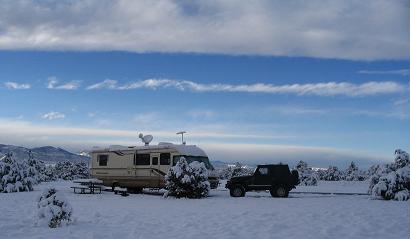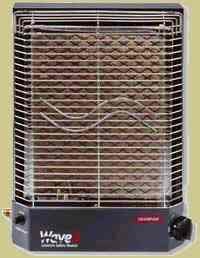Winter RV Camping Safety
Most folks feel pretty comfortable and self assured when it Winter RV camping safety. For one thing, RV’s have safety equipment such as electrical system fuses and circuit breakers, and detectors for carbon monoxide (CO) and propane leaks. These devices are designed to protect equipment and possibly save your life when functioning properly. Winter RV camping adds elements into the mix of safety that you need to take into consideration and remember because detectors, fuses, circuit breakers etc. can fail putting your life in jeopardy.

One of the biggest winter killers both in homes and camping environments is carbon monoxide (CO). Several years ago in January while volunteering with the Needles BLM Field Office, we found a dead man that had started a charcoal grill inside his vehicle for heat. People die every year from trying to use charcoal and propane heat inside homes and vehicles, including recreational vehicles. Winter RV camping safety is no joke!
Portable electric generators can fill an RV with CO under the right conditions. There was recently a report of a tragic accident where the exhaust of a portable generator was too close to the slide out of a neighboring RV killing it’s occupants. Running vehicle engines for engine heat is another killer under the right conditions. A leaky exhaust system, or a system blocked by dirt or snow piling up during a storm can raise CO very quickly. Keep in mind sudden snow storms may block the vents on furnace, water heater or refrigerator.
OK, so you don’t use your grill inside to keep warm. But some RVers use their propane powered ovens or cook tops for warmth instead of turning on the furnace. Or, in some cases, no furnace is available for warmth. Two things are happening here. Oxygen is being burned during the combustion process, and CO is being emitted at the same time. It is possible in a tight fitting area like an RV to deplete the oxygen, or build up lethal levels of CO quicker than you might imagine. Just a couple hours of heating with an oven can cause toxic levels of CO.

Vent less propane heaters are popular and according to their manufacturers, safe to use in enclosed areas such as recreational vehicles. If you plan on purchasing one of these units, make sure it is rated RV, not just “indoor”. RVs by design are tight fitting so ventilation is more critical. With the ability to heat areas without the use of electricity, recreational vehicle and tent campers have a safe heat source with a few provisos, quid pro quo, or in other words, within limitations.
All propane operated appliances emit CO plus a host of other toxic chemicals, and use oxygen. Provided adequate ventilation is provided, “safe” levels of CO can be achieved, but for those of you that are health conscious, extended use of vent less heaters can build up low levels of CO that may adversely effect you. The best information I’ve found on this subject was researched and presented by Derek Gore, and you should read his vent free heater article. Derek also has a great article about choosing a CO detector you will find informative.
Be sure that your water heater, refrigerator, and furnace vents are clear of obstruction and operating properly. These gas powered appliances all have a recommended maintenance schedule, and you need to follow it for proper equipment operation. Be sure you have propane/fuel for those gas powered appliances you will be depending on for heat and cooking.
A fire in an RV will probably burn the unit to the ground, and you will be lucky to escape with your life if one starts while you are inside. Many materials used in recreational vehicle construction are combustible and fires spread very quickly. A proper fire extinguisher located near the galley is essential in case of a grease fire. Not all fire extinguishers are for the same type fire. Get the right type! Remember portable heaters can malfunction, or something left close may catch fire. Your smoke detectors must have fresh batteries.
Have you, or someone else added electrical devices to your RV such as stereo equipment, communication devices, pumps, etc.? If so, is the wiring installed correctly and did you make sure the new load on circuits won’t cause an unsafe overload and cause an electrical fire? Adding a portable electric heater to already heavily loaded circuits may overheat wiring. If you are not sure, find somebody to help you figure it out…your life may depend on it.
Getting stuck in bad weather in remote country can be the end of you. There are newspaper stories every year about people that took a short cut, or hunters caught by a snowstorm, that died from exposure. If you are heading into remote country, make sure someone knows where you going. Keep an eye on the weather forecast and don’t take chances. Don’t bet your life on your cell phone. Power outages from a storm can kill cell service over a wide area. Staying dry and warm is essential in cold weather. Wet clothing saps heat away from your body causing hypothermia. Stay with your vehicle in all cases. Go prepared. Carry a shovel and tire chains at the very least. Learn winter survival techniques. Winter driving can be dangerous, exercise extreme caution on slippery roads. RVs are heavy and react differently than smaller vehicles on icy roads.
Are you willing to bet your life on those safety devices in your RV? Are the batteries good? Do you know the history of the vehicle to ensure that things have not been modified in an improper way that may bypass safety systems? Do you follow manufacturer recommendations concerning ventilation or electrical circuit loads? Does somebody know where you are? Does your vehicle have an emergency road kit?
Using an RV in winter is an excellent article for anyone thinking of camping in very cold weather. The Canadian author offers winter RV tips from experience at camping in -0 temperatures. Most winter RV camping involves campfires. Don’t forget that treated woods used for outdoor use, fiberboard, and plywood products including wood paneling are manufactured with glues or other compounds that are toxic when burned. Make sure your fire is completely out before going to sleep or leaving your campsite.
These are just a few of the important safety precautions you should take when winter RV camping. Winter RV camping isn’t for everyone, but by being cautious, educated, and prepared, the adventurous can be rewarded with some of the best camping experiences.

